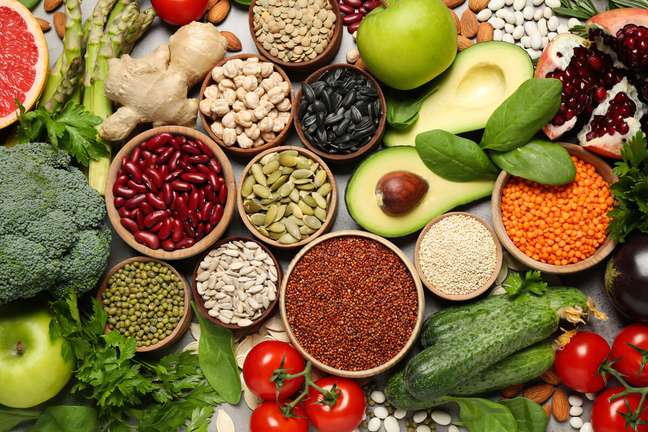Find out how eating habits affect the health of the body
An anti-inflammatory diet is a food proposition that aims to reduce chronic inflammation. Nutritionist Dr. Marianna Magri explains that when our body is inflamed, various changes occur in our body, indicating that something is wrong.

This ends up reducing our quality of life. Some indications that there may be inflammation in your body are irregularities in the intestines, energy fluctuations, excess oil on the skin, causing pimples and even dark circles.
“The anti-inflammatory diet is not a specific regimen, but an eating style. Basically, this diet focuses on a menu rich in healthy fats (olive oil, nuts, almonds, avocados, fish), nutrient-rich foods (fruit and vegetables), low glycemic carbohydrates, such as tubers, and foods that come from the earth, such as cassava, sweet potatoes, squash, fresh herbs and spices “, emphasizes Dr. Marianna Magri.
The influence of eating habits
Harvard Health Publishing studies indicate this eating habits it can strengthen the condition of inflammation in the body. So, if you want to reduce or prevent inflammation, make sure your diet consists of nutrient-rich foods that contain antioxidants. “Your anti-inflammatory diet should provide a healthy balance of proteins, carbohydrates, fats, vitamins, minerals and fiber, prioritizing foods with anti-inflammatory properties,” says Dr. Marianna Magri.
Foods that shouldn’t be on the menu
- Sweetened drinks: sugary soft drinks and fruit juices;
- Refined carbohydrates: bread, white pasta;
- Sweets: cookies, candies, cake and ice cream;
- Processed meats: turkey breast, mortadella, sausages, etc .;
- Processed snacks and filled biscuits;
- Trans fats: foods with partially hydrogenated ingredients;
- Alcohol: beer, gin, vodka etc.
Foods that cannot be missing from the anti-inflammatory diet
purple grapes
Grapes contain resveratrol, a vegetable compost with anti-inflammatory and antioxidant properties. In addition, they can help reduce the risk of various conditions, including heart disease, type 2 diabetes, and obesity.
Red fruits
Red fruits, whether blueberries, strawberries, raspberries or blackberries, contain several essential micronutrients, such as fiber and antioxidants, with action to fight inflammation. “Not only do they reduce existing inflammation, they also prepare cells to better respond to any future inflammation,” explains Dr. Marianna Magri.

Omega 3
Salmon and other fatty fish are rich in omega 3 (W3) DHA and EPA fatty acids. The anti-inflammatory properties of W3 have been described for its role in the prevention and treatment of conditions such as coronary heart disease, diabetes, inflammatory bowel disease, Alzheimer’s, bipolar disorder, schizophrenia, and cystic fibrosis. W3 is also useful for autoimmune diseases such as lupus, rheumatoid arthritis, type 1 diabetes mellitus, ulcerative colitis, psoriasis and multiple sclerosis.
Turmeric
Turmeric, or turmeric, is a tasty yellow-orange spice. Its components are called curcuminoids, the most important being curcumin. It is non-toxic and has a variety of therapeutic properties, including anti-inflammatory, antioxidantantimicrobial, hepatoprotective, immunostimulating, antiseptic and analgesic.
Green leaves
Spinach, kale, chard and rocket are rich in antioxidants, vitamins and nutrients, including folic acid, fiber, vitamins A, C, E and K. It is worth remembering that increased consumption of fruits and vegetables has been widely recommended as key component of a healthy diet to reduce the risk of serious chronic diseases.
Avocado
Avocados are sources of healthy (monounsaturated) fats, which help reduce cholesterol and joint inflammation. Avocados also contain vitamins K, C, E, manganese, selenium and zinc.
tomatoes
Tomatoes are a source of lycopene, which is the pigment that gives red and pink fruits, such as tomatoes, watermelon and strawberries, their distinctive color. It is a nutrient with antioxidant properties associated with health benefits, ranging from heart health to sunburn protection.
Extra virgin olive oil
Olive oil contains about 36 phenolic compounds, and it is this phenolic fraction responsible for the anti-inflammatory benefits, antioxidant and antimicrobial. The main anti-inflammatory effects of olive oil are mediated by antioxidants. Chief among these is oleocanthal, which has been shown to act similarly to ibuprofen, an anti-inflammatory drug.
chia
Chia seeds are known as a superfood. They offer all nine essential amino acids and are therefore a high quality plant protein. More than 80% of the carbohydrate content of the seeds is in the form of fiber. “This fiber can be fermented in the intestine, promoting the formation of fatty acids and improving colon health. Another important feature of chia is its high omega-3 content. In fact, chia is the best-known plant source. of W-3. “, even better than linseed”, concludes Dr. Marianna Magri.
Marianna Magri
Doctor with the title of the Brazilian Medical Association and the Brazilian College of Radiology and Nutritional Medicine – Albert Einstein Food and Health Training Hospital (Stanford). She has been working in the health market for over five years and has always been passionate about cooking and healthy eating. She has been studying the subject for over 20 years, ever since her childhood. Today she is a reference in diagnostic imaging and weight loss, with over 8 thousand hours of service, with successful cases when it comes to advanced weight loss.
by Gabriela Dallo
Source: Terra
Benjamin Smith is a fashion journalist and author at Gossipify, known for his coverage of the latest fashion trends and industry insights. He writes about clothing, shoes, accessories, and runway shows, providing in-depth analysis and unique perspectives. He’s respected for his ability to spot emerging designers and trends, and for providing practical fashion advice to readers.






